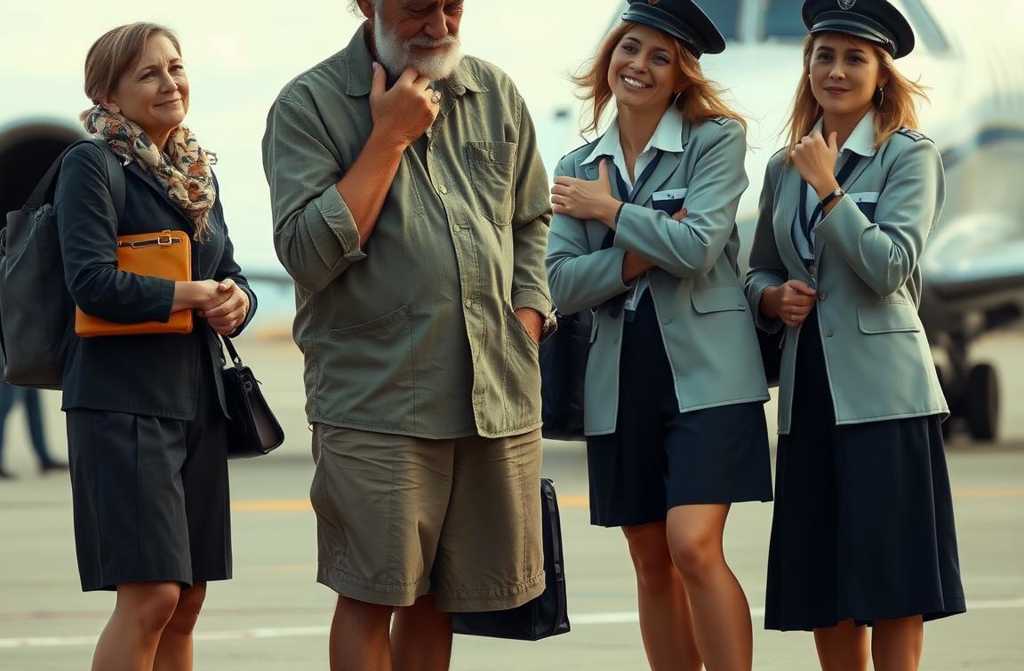З життя
The Widowed Father Who Sold Everything for His Daughters’ Education — Twenty Years Later, They Return in Pilot Uniforms and Take Him Where He Never Dared to Dream

In a quiet rural village in the south of England, where a family scraped by on a small patch of farmland and backbreaking work on construction sites, lived William Thompsona widowed father whose heart overflowed with dreams for his daughters. Having only learned to read through basic literacy classes in his youth, William clung to one hope: that his twin girls, Poppy and Daisy, might have a better life through education.
When the girls turned ten, William made a decision that would change their fate. He sold everything he ownedtheir thatched-roof cottage, the little plot of land, even his rusty bicycle, the only tool that helped him earn extra money delivering goods. With what little savings he had, he took Poppy and Daisy to London, determined to give them a real chance.
He worked any odd job he could findhauling bricks on building sites, unloading crates at the market, collecting cardboard and plasticlaboring day and night to pay for their school fees and food. Though often exhausted, he made sure they never wanted for anything.
“If I suffer, so be it,” he told himself. “As long as they have a future.”
But city life was harsh. At first, William slept under bridges, using nothing but a scrap of tarp for warmth. Many nights, he skipped dinner so the girls could eat salted rice and boiled vegetables. He learned to mend their clothes and wash their uniformshis rough hands cracked and bled from detergent and icy winter water.
When the girls cried for their mother, he could only hold them tight, tears streaming silently as he whispered,
“I cant be your mum but Ill be everything else you need.”
The years of struggle took their toll. One day, he collapsed on a building site, but the thought of Poppy and Daisys hopeful eyes made him rise again, jaw clenched. He never let them see his wearinessalways saving his smiles for them. At night, he sat under a flickering lamp, struggling to read their textbooks, learning letter by letter just to help with their homework.
If they fell ill, hed race through backstreets to find affordable doctors, spending every last pound on medicineborrowing money if he had to, just so they wouldnt suffer.
His love for them was the flame that warmed their tiny home through every hardship.
Poppy and Daisy were bright students, always at the top of their class. No matter how poor they were, William never stopped telling them,
“Study hard, my girls. Your future is my only dream.”
Twenty-five years passed. William, now frail with snow-white hair and trembling hands, never stopped believing in them.
Then one day, as he rested on a cot in their rented flat, Poppy and Daisy returnedstrong, radiant women in crisp pilot uniforms.
“Dad,” they said, taking his hands, “we want to take you somewhere.”
Bewildered, William followed them to a car then to the airportthe very place he used to point out to them behind a rusted gate when they were little, saying,
“If you ever wear that uniform itll be my greatest joy.”
And now here he stood, before a towering aeroplane, flanked by his daughtersnow pilots for Britains national airline.
Tears rolled down his weathered cheeks as he hugged them tight.
“Dad,” they whispered, “thank you. For all your sacrifices today, we fly.”
Those at the airport watched, moved by the sighta humble man in worn-out shoes, proudly led across the tarmac by his two daughters. Later, Poppy and Daisy revealed theyd bought him a new home. They even set up a scholarship in his name to help young women with big dreamsjust like theirs.
Though his eyesight had faded with age, Williams smile had never shone brighter. He stood tall, gazing at his girls in their gleaming uniforms.
His story became an inspiration across the country. Once a poor labourer, stitching torn uniforms by lamplight, he had raised daughters who now soared through the skiesand in the end, love had carried him to heights hed once only dared to imagine.

















